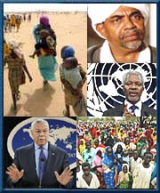Sudan government under pressure over Darfur
By Tume Ahemba
ABUJA, Sept 7 (Reuters) – Sudan’s government and Darfur rebels were due to meet on Tuesday to try to thrash out a security agreement after two weeks of peace talks but mediators were pessimistic a deal could be reached quickly.
 The government and rebels remained far apart on key security issues, including disarming warring factions, in the talks mediated by the African Union in the Nigerian capital, Abuja.
The government and rebels remained far apart on key security issues, including disarming warring factions, in the talks mediated by the African Union in the Nigerian capital, Abuja.
The talks have reached an impasse due to weak diplomatic pressure on rebels and government fears rebels will secede, one analyst said.
“I don’t know how much the rebels want to talk about. There doesn’t seem to be any of the pressure on them as there is on Sudan,” Tom Cargill, Africa Programme Coordinator at the Royal Institute of International Affairs told Reuters by telephone from London.
The United Nations calls Darfur the world’s worst humanitarian crisis and has threatened Khartoum with sanctions if it does not fully rein in Arab Janjaweed militiamen used by the government as auxiliaries in their bid to crush the rebels.
More than a million people in the vast arid province of Darfur have fled their homes in the last 19 months for fear of attack by the Janjaweed. The United Nations estimates about 50,000 people have been killed in the conflict.
The rebellion in the vast arid western province started 19 months ago, following years of low-intensity fighting between mainly African farmers and Arab nomads over land rights.
PEACE PROCESS SLOWING
A deal made last week on addressing the humanitarian situation in Darfur is being held hostage by the rebels who say they will not sign it unless a security agreement has been made.
Rebels also say they will not sign a security agreement until a political deal has been sealed.
Mediators have said a deal will eventually be reached but that it could just take a long time.
The rebels demand a political solution to the crisis based on a deal struck in the Kenyan town of Naivasha earlier this year aimed at ending a 21-year-old conflict between the government and rebels in Sudan’s south.
Cargill said rebels’ demands for power- and wealth-sharing measures which could lead to autonomy in the south and the west may eventually threaten the existence of Sudan itself.
“These talks are not about who controls Darfur, but about who controls Khartoum,” said Cargill.
The Darfur peace process may be slowing up the peace process because Khartoum fears its territorial sovereignty is being threatened by demands to give away concessions at negotiations.
“Sudan is using the Naivasha process — which is in its final stages — as a bargaining chip for Darfur. It’s about the only bargaining chip they have left with the international community, and it seems to be working,” he said.
Rebels say they will not garrison their troops until the Janjaweed are disarmed. But the government, who officially denies they support the Janjaweed, say they will not disarm until the rebels move their soldiers into containment areas.
The rebels want an independent international human rights tribunal established for Darfur, but Sudan only agrees to a tribunal if it is Sudanese. Rebels say this defeats the object of having an independent tribunal.
The African Union has called for the implementation of a ceasefire, but the rebels continue to accuse the government of ceasefire violations.
The rebels say they back African Union proposals to increase the currently 300 African Union troops on the ground in Darfur to protect ceasefire monitors, but the Sudanese government has so far rejected the offer.
(Additional reporting by Dino Mahtani in Lagos)
